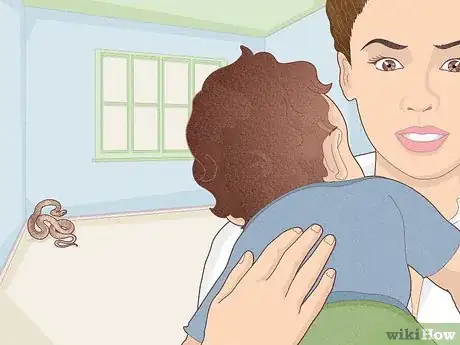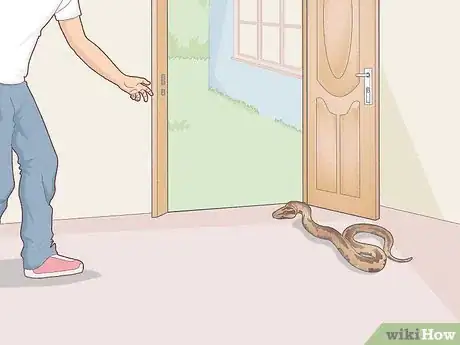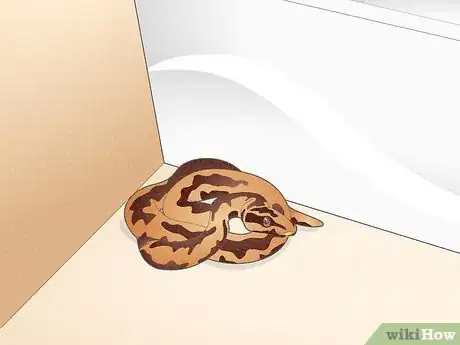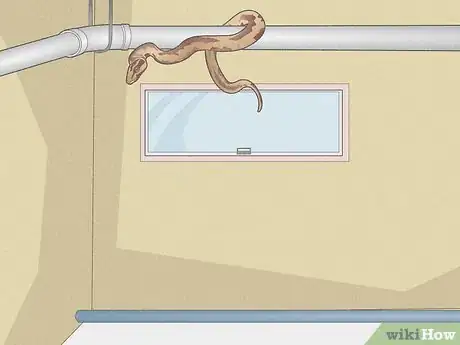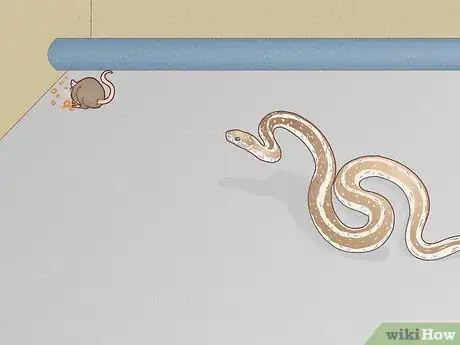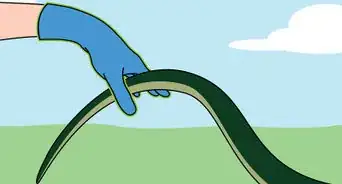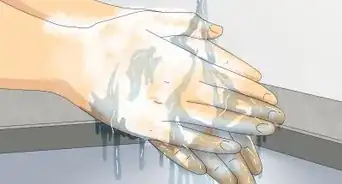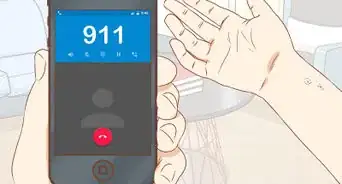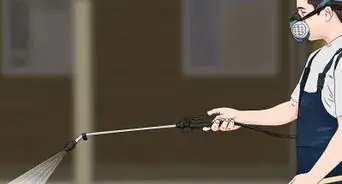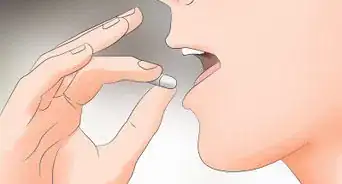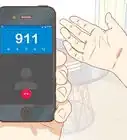This article was co-authored by Kevin Carrillo. Kevin Carrillo is a Pest Control Specialist and the Senior Project Manager for MMPC, a pest control service and certified Minority-owned Business Enterprise (MBE) based in the New York City area. MMPC is certified by the industry’s leading codes and practices, including the National Pest Management Association (NPMA), QualityPro, GreenPro, and The New York Pest Management Association (NYPMA). MMPC's work has been featured in CNN, NPR, and ABC News.
wikiHow marks an article as reader-approved once it receives enough positive feedback. In this case, several readers have written to tell us that this article was helpful to them, earning it our reader-approved status.
This article has been viewed 665,937 times.
It can be quite a surprise if you come across a snake in your house! Though they can definitely give you a fright, keep in mind that snakes don’t come inside looking to harm you. Keep your calm while you figure out what to do and avoid provoking the snake. Not all snakes are deadly, but it’s best to always err on the side of caution. We’ve put together some questions and answers to help you safely deal with snakes in your home and on your property.
Steps
What do you do if you see a snake in your house?
-
1Clear animals or young children from the area. Because of their size, your pets and children are more at risk if bitten than a fully-grown adult. Their movements also tend to be more unpredictable and they are more likely to agitate the snake. Calmly move them away from the area, so you can safely deal with the snake on your own.[1]
- If you have a child that gets bitten, call emergency services immediately. Even if the snake is not venomous, it’s better to be safe than sorry.
- If you suspect that your pet has been bitten, bring them to your local veterinarian or call Poison Control. There may be some redness, swelling, or bruising on your animal. If so, you should act quickly, as they may be at risk of further harm or even death.
-
2Remain calm and don’t provoke the snake. A snake won't normally attack you unless it feels threatened by you, so keep your cool. Don’t try to attack a snake with a broom or some other object or you risk provoking it. You are a larger predator and the snake should keep to itself if you don't bother it.[2]
- If you see that the snake has coiled itself up and opened its mouth wide, then you know it sees you as a threat. Step away slowly to avoid any further risk.
- Remember that snakes help control rodent and insect populations. So, while it's not comforting to see one in your home, you really don't want to kill it, as it does help control pest populations in your area.
How do you get rid of snakes in a house?
-
1Create a safe distance between you and the snake. Even if you have the smallest suspicion that you have a venomous snake on your property, avoid getting too close. You might not want to leave the snake completely alone, as it could move to another place in your home without you knowing where, but keep your distance. If the snake is mobile, however, and you worry that your presence might provoke it, evacuate the area and call Animal Control.[3]
- If the snake is still and coiled, you can slowly place an upside-down bucket or box over it to keep it from going anywhere. You can also barricade an area off with boards or boxes to restrict its movement.
-
2Open the door and guide the snake out with a broom. Only take this risk if you're certain the snake is not venomous. You shouldn't try to push the snake with the broom. Simply open the door and attempt to guide it out softly. Because the snake's presence in your home is most likely completely accidental, it might be trying to get out itself![4]
- If the snake is in an area with multiple doors to the outside, such as a garage, try opening all of the doors. The snake may even find its own way out when it sees a nearby escape route.
-
3Call Animal Control and ask them to send an expert to collect the snake. Do this if you can’t guide the snake out on its own, if you really don’t want to go near it, or if you think it might be venomous. The experts from Animal Control can safely catch and release it far from your property, so you don’t have to get too close or handle it in any way.[5]
- You can also call a professional pest control company to come deal with the snake if there’s no Animal Control in your area.
Expert Q&A
Did you know you can get expert answers for this article?
Unlock expert answers by supporting wikiHow
-
QuestionWhat smell do snakes hate?
 Kevin CarrilloKevin Carrillo is a Pest Control Specialist and the Senior Project Manager for MMPC, a pest control service and certified Minority-owned Business Enterprise (MBE) based in the New York City area. MMPC is certified by the industry’s leading codes and practices, including the National Pest Management Association (NPMA), QualityPro, GreenPro, and The New York Pest Management Association (NYPMA). MMPC's work has been featured in CNN, NPR, and ABC News.
Kevin CarrilloKevin Carrillo is a Pest Control Specialist and the Senior Project Manager for MMPC, a pest control service and certified Minority-owned Business Enterprise (MBE) based in the New York City area. MMPC is certified by the industry’s leading codes and practices, including the National Pest Management Association (NPMA), QualityPro, GreenPro, and The New York Pest Management Association (NYPMA). MMPC's work has been featured in CNN, NPR, and ABC News.
Pest Control Specialist
-
QuestionCan I call 911 if I see a snake?
 Kevin CarrilloKevin Carrillo is a Pest Control Specialist and the Senior Project Manager for MMPC, a pest control service and certified Minority-owned Business Enterprise (MBE) based in the New York City area. MMPC is certified by the industry’s leading codes and practices, including the National Pest Management Association (NPMA), QualityPro, GreenPro, and The New York Pest Management Association (NYPMA). MMPC's work has been featured in CNN, NPR, and ABC News.
Kevin CarrilloKevin Carrillo is a Pest Control Specialist and the Senior Project Manager for MMPC, a pest control service and certified Minority-owned Business Enterprise (MBE) based in the New York City area. MMPC is certified by the industry’s leading codes and practices, including the National Pest Management Association (NPMA), QualityPro, GreenPro, and The New York Pest Management Association (NYPMA). MMPC's work has been featured in CNN, NPR, and ABC News.
Pest Control Specialist
References
- ↑ http://npic.orst.edu/pest/snake.html
- ↑ http://www.livescience.com/43597-facts-about-water-moccasin-cottonmouth-snakes.html
- ↑ Kevin Carrillo. MMPC, Pest Control Specialist. Expert Interview. 22 October 2019.
- ↑ http://www.humanesociety.org/animals/snakes/tips/solving_problems_snakes.html?referrer=https://www.google.com/#
- ↑ Kevin Carrillo. MMPC, Pest Control Specialist. Expert Interview. 22 October 2019.
- ↑ https://environment.des.qld.gov.au/wildlife/animals/living-with/snakes/frequent-questions#snake_identification
- ↑ http://npic.orst.edu/pest/snake.html
- ↑ http://npic.orst.edu/pest/snake.html
- ↑ http://npic.orst.edu/pest/snake.html
About This Article
To deal with a snake in the house, start by getting a good look at the snake to determine if it’s venomous. For example, if the snake has a fat body, large fangs, slit-like eyes, or a rattling tail, the snake is likely venomous. In that case, evacuate the area immediately and call Animal Control. If you’re certain the snake is not venomous, open the door and try to guide the snake outside with a broom. Alternatively, place a blanket on top of the snake to restrict its motion, and scoop it up to transport it outside. For more tips, like how to prevent snakes from entering your house, read on!
